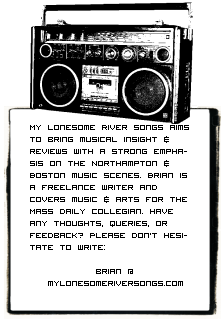Daily Collegian | October 4, 2007
Resembling the battered denim jacket and dusty leather hat that he adorned, Jason Molina's lyrics exposed a traveled and well-worn man. Molina is constantly running from his ghosts while searching for silver linings. He is always in motion and never stagnant.
Molina's musical collective Magnolia Electric Co. took to the dimly-lit stage of the Iron Horse Music Hall in Northampton Tuesday night. This particular stop on the road was one that Molina admitted he made special efforts to make happen.
"We love to play this room," Molina confessed following the first song of the evening. He applauded the crowd for creating such a positive musical environment in Northampton before further delving into a handful of musical selections from his expansive repertoire.
Molina first emerged onto the music scene performing and recording under the moniker, "Songs: Ohia," recording both as a solo musician as well as with a rotating set of musicians. Molina released his first full-length work in 1997, when "Songs: Ohia" was unveiled to the public on Secret Canadian Records, a label he has remained loyal to ever since.
Following the debut, "Songs: Ohia" released five full length albums; 1999's "Axxess And Aces," 1998's "Impala," 2000's "The Lioness" and "Ghost Tropic" and 2002's "Didn't It Rain," as well as several tour-only albums, singles and EPs. It wasn't until the release of 2003's "Magnolia Electric Co.," that Molina announced that all of his future collaborative work would be played and recorded under the same name as his latest album, while any continued solo work would be released under his own name.
Molina & Magnolia Electric Co. are currently touring in support of their most ambitious work to date, "Sojourner," a four album one DVD box set limited to 5,000 copies worldwide. The box set chronicles the bands works from the past two years following the releases of their last two studio albums 2005's "What Comes After The Blues," and 2006's "Fading Trails," and includes "The Road Becomes What You Leave" a film by Todd Chandler and Tim Sutton documenting the band's trek across the prairie provinces of Canada.
For their set on Tuesday, Molina opened the night with a selection from the new box set, "Texas-71." The song's minimalist organ driven verses contrasted by Molina's rich overpowering voice created a fitting commencement to the evening.
"Now I think twice about every bargain," Molina confessed, "everything I've had and what I've walked out on."
Molina wasted no time pulling his listeners into his past indecisions, and informed them of his constant flight from them. "Now which one of these can I not outrun and which one of these can I ... baby down Texas 71."
Following some lighthearted stage banter, the band quickly broke into "Montgomery," another solemn tale of Molina's own inability to be stationary in life. With an emotional flutter in his voice, Molina softly professed, "no want, no waste and no fight, this boy is Montgomery bound," reasserting to the audience that he is always on the move, while finally concluding, "the road becomes what you leave and my ghost ain't waiting."
Without warning or hesitation the band seamlessly transitioned into "Hammer Down," a fitting up tempo conclusion to "Montgomery." The song reaches its crescendo with Molina stating emphatically that he is "heaven bound" hypothesizing that he has seen the light and is making his way towards it with reckless abandon.
This was the first glimpse of optimism presented to the crowd, who had quickly become entirely consumed in Molina's personal blues, and hinted at a possible turn of fortune for the inherently troubled songwriter.
This sigh of relief proved to be short lived.
With his next two selections, "Bowery" and "Leave The City" Molina returned to allusions to his past emotional scars. No longer was he traveling towards heaven such as on "Hammer Down," rather Molina had slipped back into darkness and regret. Molina croons on "Bowery," "Broken hearts were the only things listening and blue eyes, I heard everything."
In "Leave The City" Molina reminisces about fleeing Chicago at an earlier stage in his life, a decision he remembers having all the reasons in the world for making, but in retrospect can't remember what they were in actuality. Just as sudden as the ray of optimism that sneaked its way into Molina's story arch appeared, he quickly retreated, reminding the audience of his inescapable past regrets, a theme that would resonate for the remainder of the performance.
Molina closed the evening with two selections off of the "Magnolia Electric Co." album. Onlookers cheered with delight when the band thrust into a self-proclaimed "classic rock" full band rendition of "Just Be Simple," and again for the final song of the night, "Farewell Transmission."
Like any well-constructed story, it was not until the show's very conclusion that Molina finally put his life long journey with the blues into context for listeners, eloquently professing on "Farewell Transmission" that "the real truth about it is no one gets it right, the real truth about it is we're all supposed to try. There ain't no end to the sands I've been trying to cross. The real truth about it is my kind of life's no better off if I've got the maps or if I'm lost. The real truth about it is there ain't no end to the desert I'll cross, I've really known that all along."
During the performance Molina's songs became more than just simple narratives, they became personal confessions. When he proclaimed, "I'm not looking for that easy way out," he meant it. There were no cop-outs in his approach, no shortcuts in his delivery and certainly no ambiguities for listeners to wrestle with in his wording, his voice acting as a trembling instrument of honesty.
In "Left the City" Molina explained, "Half my life spent on a highway, half my life I didn't choose, and I have seen the North Star." The North Star is the universal compass for any common traveler, but for Molina it is the embodiment of the light at the end of his tunnel, and while he accepts that he'll never reach it, he keeps traveling on. Traveling the only way he knows how: hammering down, one stop at a time.















No comments:
Post a Comment